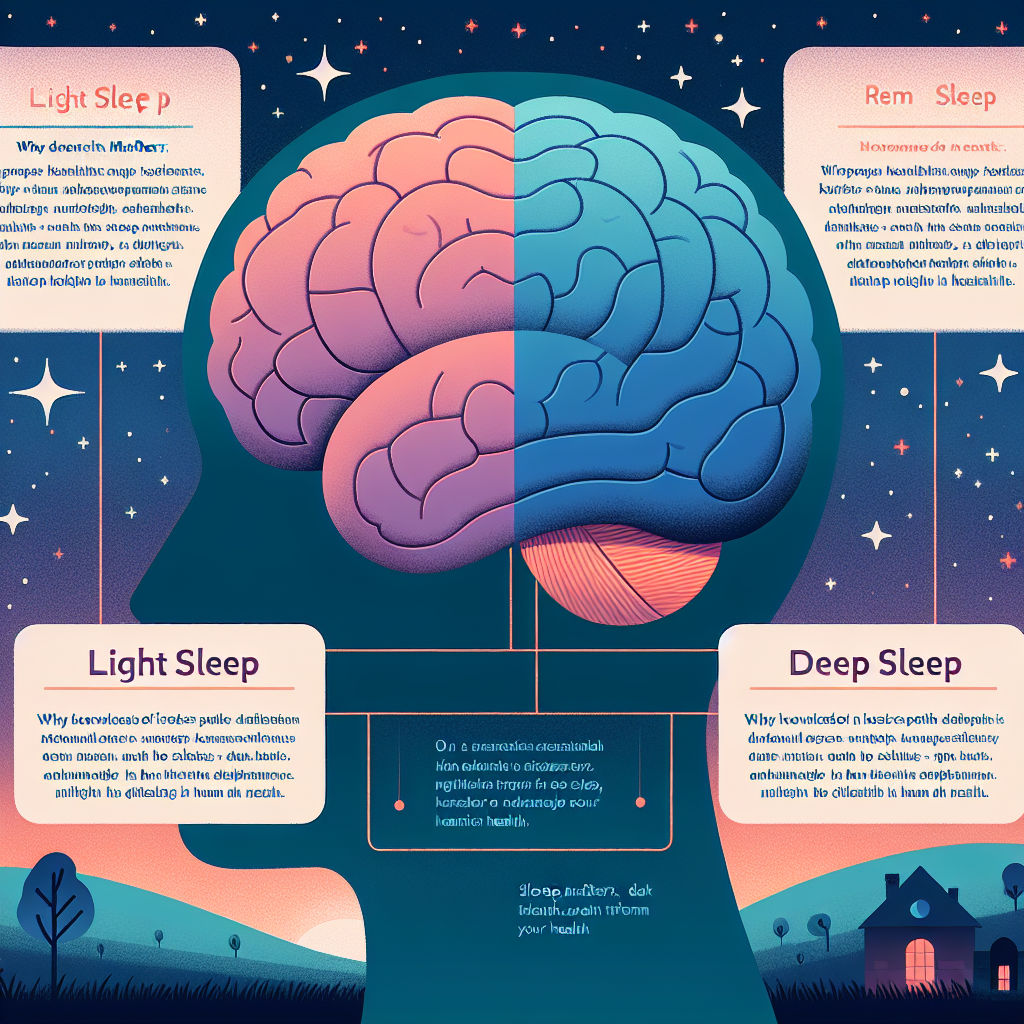
Sleep Matters: Why Knowledge of Sleep Stages Can Transform Your Health
Introduction
Have you ever woken up feeling more exhausted than when you went to bed? You’re not alone; countless individuals grapple with sleep-related issues that leave them feeling drained. Sleep matters far more than we often realize. It’s not just about the quantity of sleep; the quality of sleep—and understanding the various stages of sleep—can significantly transform your health. In this ultimate guide, we will dive deep into the importance of sleep stages, unraveling the science behind them and showcasing how your sleep quality impacts every aspect of your well-being. Prepare for an eye-opening journey into the slumber that fuels your productivity, mental clarity, and overall health.
What Are Sleep Stages?
Understanding what sleep stages entail is crucial for both improving sleep quality and overall health. Sleep is divided into two main types: Non-Rapid Eye Movement (NREM) sleep and Rapid Eye Movement (REM) sleep. These types are further broken down into distinct stages, each playing a unique role in ensuring your body and mind recover and rejuvenate.
NREM Sleep
NREM sleep consists of three stages:
Stage 1: Light Sleep
This is the transition phase between wakefulness and sleep, lasting only a few minutes. During this light sleep, your heartbeat and breathing slow, and your muscles relax, leading to a state of drift into deeper stages.
Stage 2: Moderate Sleep
Lasting about 20 minutes, Stage 2 accounts for approximately 50% of total sleep. Your body temperature drops, and brain waves show a unique pattern of sleep spindles, which may play a role in memory consolidation.
- Stage 3: Deep Sleep
Also known as slow-wave sleep, this stage is crucial for physical recovery and growth. It takes place more in the first half of the night and is essential for immune function and energy restoration.
REM Sleep
REM sleep is the stage where most dreaming occurs and is critical for cognitive functions such as memory, learning, and emotional regulation. It typically begins about 90 minutes after falling asleep and recurs several times throughout the night, with each cycle getting longer.
Why Does Sleep Matter?
Understanding sleep stages ultimately brings awareness to how sleep matters for various aspects of our health. Here is a closer look:
Physical Health
Immune Function
A lack of adequate deep sleep can weaken the immune system, making you more susceptible to infections. Studies show that individuals who sleep less than seven hours a night are three times more likely to catch a cold.
- Weight Regulation
Sleep deprivation disrupts hormones like ghrelin and leptin, which regulate appetite. This imbalance can lead to increased cravings and poor food choices, contributing to weight gain.
Mental Health
Mental well-being is profoundly affected by sleep. Quality REM sleep helps regulate mood, cope with stress, and establish emotional resilience.
Cognitive Function
Inadequate REM sleep impairs memory consolidation, decision-making, and problem-solving abilities. It also elevates stress levels, leading to a cycle of anxiety.
- Psychological Disorders
Chronic sleep issues are linked to mood disorders, including depression and anxiety. Proper knowledge of sleep stages can empower individuals to prioritize and enhance sleep quality.
Case Study: Improved Mental Health from Sleep Awareness
The Story of Sarah, a 32-year-old marketing executive, illustrates the impact of understanding sleep. Initially, Sarah was unaware of her poor sleep patterns. After attending a workshop on sleep cycles, she became aware of her lack of deep sleep due to late-night screen time. Implementing a wind-down routine, reducing screen exposure, and improving her sleep environment led to significant improvements in her mood and productivity.
Analysis: This case showcases the transformative power of understanding sleep stages. A simple shift in habits based on sleep knowledge resulted in profound benefits, highlighting that sleep matters for both mental health and performance.
Practical Insights: How to Optimize Your Sleep Stages
Establish a Sleep Schedule
Going to bed and waking up at the same time each day, even on weekends, helps regulate your body’s circadian rhythm. This consistency ensures your body goes through the complete cycle of sleep stages effectively.
Create a Restful Environment
Your sleep environment should be conducive to relaxation. Consider using blackout curtains, investing in a quality mattress, and maintaining a cool room temperature to promote deep sleep.
Limit Stimulants
Avoid caffeine and nicotine, particularly in the hours leading up to bedtime. Stimulants can interfere with your ability to progress through sleep stages, leading to restless nights.
Incorporate Relaxation Techniques
Consider practices such as meditation, deep-breathing exercises, or light yoga before bed. These techniques can help transition the body from wakefulness to the sleep stages needed for restorative rest.
Monitor Your Sleep
Many wearable devices track sleeping patterns and stages, helping you pinpoint issues like insufficient REM or deep sleep. Use this data to make informed adjustments to your sleep routine.
Case Study: The Impact of Tracking Sleep
Meet John, a 45-year-old teacher, who utilized a wearable device to monitor his sleep stages. After analyzing data from his sleep cycles, he realized he wasn’t achieving enough deep sleep. By adjusting his evening routine and removing caffeine two hours before bed, John managed to increase his deep sleep by 30%, significantly enhancing his daytime alertness and cognitive function.
Analysis: This case highlights the role of technology in understanding sleep stages. Knowing how well you sleep can lead to targeted changes that positively affect health outcomes.
How Sleep Stages Affect Daily Life
The ripple effect of sleep stages permeates all facets of daily living. Here’s a closer look at how your sleep quality impacts various responsibilities and activities:
Work Performance
Quality sleep directly correlates with productivity and performance at work. A well-rested individual can concentrate better, make fewer mistakes, and maintain a more positive attitude—enhancing workplace relationships and effectiveness.
Athletic Performance
Athletes rely heavily on sleep for optimal performance. Research shows that increased sleep improves speed, reaction times, and overall athletic efficiency.
Relationships
Sleep deprivation can lead to irritability and reduced patience, straining personal and professional relationships. Understanding how to achieve quality sleep fosters better emotional interactions and communication.
Conclusion
Sleep matters are not merely a luxury—they’re essential for leading a healthy, productive life. By educating ourselves about sleep stages and how they impact well-being, we empower ourselves to make informed decisions regarding our health. Whether you’re a professional seeking to enhance your performance or an individual striving for emotional stability, understanding sleep can provide the transformation you seek. Make sleep a priority, and you may unlock not just rest, but a vibrant quality of life.
FAQs
1. How many sleep cycles should I go through each night?
Typically, adults go through 4 to 5 sleep cycles per night, each lasting about 90 minutes.
2. What role do naps play in my sleep stages?
Short naps can enhance alertness and cognitive performance; however, long naps can lead to grogginess and disrupt nighttime sleep patterns.
3. Can I "catch up" on sleep over the weekend?
While catching up can help alleviate some sleep debt, consistent sleep patterns are crucial for health. Occasional over-sleeping may not fully counteract the effects of chronic sleep deprivation.
4. Are certain foods better for sleep?
Yes! Foods rich in tryptophan (like turkey, nuts, and dairy) and magnesium (such as leafy greens and whole grains) can promote better sleep by supporting the body’s natural processes.
5. How long before bedtime should I stop using screens?
It’s recommended to stop using screens at least 1 to 2 hours before bedtime to avoid the negative impact of blue light on your sleep quality.
By grasping how sleep stages function and their importance, you can take actionable steps to cultivate a healthier, happier life. Sleep matters. Prioritize it, and watch as it transforms your health into something exceptional.















